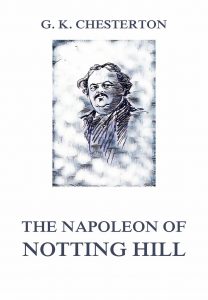The Napoleon of Notting Hill – Gilbert Keith Chesterton
Mad, perfectly mad, madder than the immortal tea-party of Alice, is the thought while reading this novel, or satire, or caricature, or allegory, or farce, or joke, or whatever it is, which Mr. Chesterton has published. When you have finished reading the book, you lay it down and positively gasp, your brain whirls and you stagger with the question whether you have been reading a book, or dreaming a dream. You feel of the book, find it there — very substantial, and then you wonder whether you or the writer is mad: it must be one or the other. Then you remember that Mr. Chesterton is a perfectly sane man, a writer of great ability and much distinction. Then you also remember that Lewis Carroll was a mathematician, and you realize that no madman can write entertaining madness, and you come to the conclusion that it is you who lack the key. Then you think it all over; and you not only do not find the key, but you do not even find the keyhole. You ask someone else about it; he says no one has found the key, — not the best searchers. You finally decide that there is no key, and no keyhole, that the whole tiling is just a nebulous mass of gas — laughing-gas, to be taken as an antidote for the pain of modern life and the dullness of fiction. A humorous and satirical tale of English politics. While an intimate knowledge of the ins and outs of the British policies and shibboleths of the day is required to appreciate all the author’s points, yet the story will interest those who love the odd and unusual.
Format: Paperback
The Napoleon of Notting Hill.
ISBN: 9783849678944
Available at amazon.com and other venues.
Summary of Gilbert Keith Chesterton (from Wikipedia):
Gilbert Keith Chesterton, KC*SG (29 May 1874 – 14 June 1936), better known as G. K. Chesterton, was an English writer, poet, philosopher, dramatist, journalist, orator, lay theologian, biographer, and literary and art critic. Chesterton is often referred to as the “prince of paradox”. Time magazine has observed of his writing style: “Whenever possible Chesterton made his points with popular sayings, proverbs, allegories—first carefully turning them inside out.”
Chesterton is well known for his fictional priest-detective Father Brown, and for his reasoned apologetics. Even some of those who disagree with him have recognised the wide appeal of such works as Orthodoxy and The Everlasting Man. Chesterton routinely referred to himself as an “orthodox” Christian, and came to identify this position more and more with Catholicism, eventually converting to Catholicism from High Church Anglicanism. George Bernard Shaw, his “friendly enemy”, said of him, “He was a man of colossal genius.” Biographers have identified him as a successor to such Victorian authors as Matthew Arnold, Thomas Carlyle, Cardinal John Henry Newman, and John Ruskin.
(The text of the last section was taken from a Wikipedia entry and is available under the Creative Commons Attribution-ShareAlike License.)
Publisher’s Note: This book is printed and distributed by Createspace a DBA of On-Demand Publishing LLC and is typically not available anywhere else than in stores owned and operated by Amazon or Createspace.

